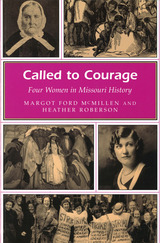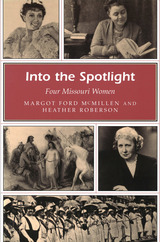2 books by Roberson, Heather

Called to Courage
Four Women in Missouri History
Margot Ford McMillen & Heather Roberson
University of Missouri Press, 2002
While there are many accessible biographies of important Missouri men, there are few such biographies of Missouri women, which might suggest that they did not count in history. This book, written by a mother-and-daughter team, helps to correct that misconception by tracing the lives of four women who played important roles in their eras. These women were exceptional because they had the courage to make the best of their abilities, forging trails and breaking the barriers that separated women’s spheres from those of men:
· A Native American woman the French newspapers called “Ignon Ouaconisen,” and the people of Paris called the “Missouri princess,” lived from about 1700 to after 1751. She traveled with adventurer Etienne de Bourgmont and bore his child. Although much of her life remains a mystery, her story gives us insights into the lives of Missouri Indian women in the days of the fur trade.
· Pioneer Olive Boone (1783–1858) came to the Louisiana Territory as the teenage bride of Nathan Boone, guiding a skiff and their horses across the Missouri River to join the Daniel Boone family near St. Charles. For much of her married life, she stayed alone with her fourteen children while her husband traveled on lengthy hunting expeditions, supervised the Boone saltworks in present-day Howard County, and spent years in the military.
· Martha Jane Chisley, born a slave in 1833, was brought to northeast Missouri as a young woman. During the Civil War, Martha Jane escaped with her children to Illinois. She overcame many obstacles so that her son Augustine was able to enter school and get an education. Augustine studied in Rome and became the first nationally known African American priest.
· Nell Donnelly of Kansas City was a pioneering businesswoman who founded a dress company that became the world’s largest, brightening the wardrobe of the “housewife” while also creating fair working conditions for her employees. Born into an ordinary middle-class family in 1889, she achieved a success and high profile that brought its own problems.
Using Missouri and Illinois archives, Margot Ford McMillen and Heather Roberson have compiled well-known and obscure materials to describe the lives of both women and men, showing how roles changed as Missouri and America matured. Bringing together family insights and the rare writings of observers who almost never mention women in their journals, Called to Courage will be welcomed by anyone interested in women’s history or Missouri history.
[more]

Into the Spotlight
Four Missouri Women
Margot Ford McMillen & Heather Roberson
University of Missouri Press, 2004
As a companion volume to their earlier book, Called to Courage: Four Women in Missouri History, Margot Ford McMillen and Heather Roberson’s Into the Spotlight provides the biographies of four more remarkable Missouri women. Although these women came from radically different circumstances, they all shared a common sense of purpose, determination, and courage, and each used her own unique position to empower herself and others
Sacred Sun, also called Mohongo, was a Native American of the Osage tribe in Missouri. In 1827, her people lost their land, their sacred places, and many of their traditions. Seeking answers to the dilemma faced by her people, and possibly aid from the French, she journeyed to Europe with a group of prominent Osage and a French entrepreneur. The harrowing events she experienced there would shape the woman she became when she returned to the Osage tribe, which had been forced to move to Oklahoma and was still struggling to survive.
Emily Newell Blair was born into a successful southwest Missouri family. Although she was born at a time when the contributions of women in the workforce were quite limited, she was encouraged by her family to get an education and expand her skills in writing and speaking. When women did begin to pursue education and careers, Blair was at the forefront, working tirelessly to secure voting rights for women. Eventually, she was elected to the Democratic National Committee and later poured her energy into organizing Democratic women’s clubs.
Josephine Baker grew up in segregated turn-of-the-century St. Louis society, which determined human worth by the color of one’s skin. Her mixed ethnic background left Baker feeling isolated both from her own black family and from white society. Driven to develop her own unique style, she became a star of song and stage, toured Europe, served as a spy, and was a fervent civil rights and antiracism activist.
Elizabeth Virginia Wallace, known to her family as “Bess,” grew up in one of Missouri’s most prominent families. She married a neighborhood boy—considered unacceptable by her mother—who would go on to become President Harry Truman. Bess Truman, called “the boss” by her husband, worked side by side with him, editing his speeches and providing advice and guidance through innumerable crises during and after World War II.
Into the Spotlight provides valuable new insights into Missouri and American history, as well as women’s history, and will be a welcome addition to the Missouri Heritage Readers Series.
[more]
READERS
Browse our collection.
PUBLISHERS
See BiblioVault's publisher services.
STUDENT SERVICES
Files for college accessibility offices.
UChicago Accessibility Resources
home | accessibility | search | about | contact us
BiblioVault ® 2001 - 2024
The University of Chicago Press









